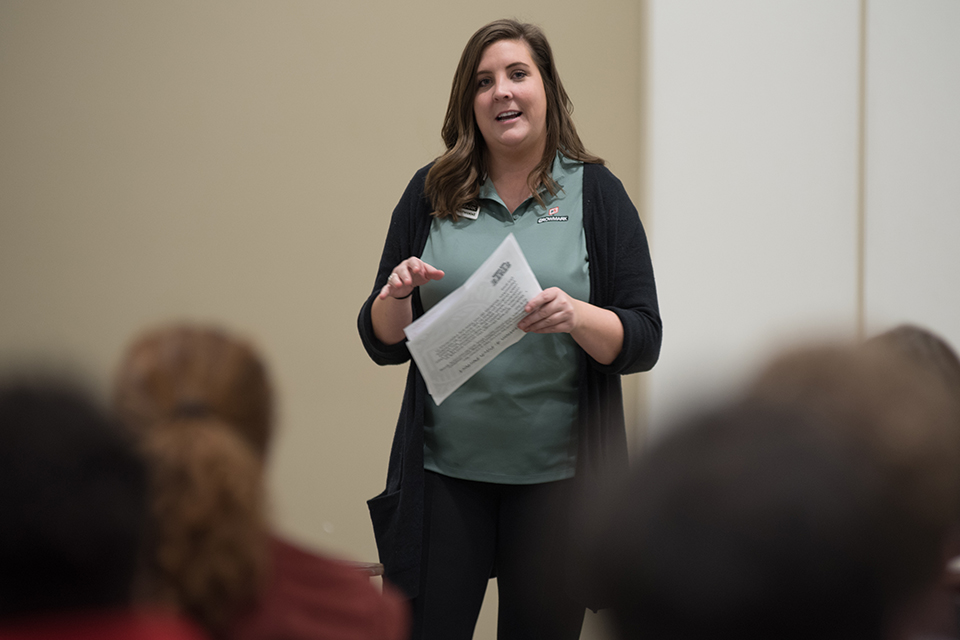I walked onto the stage. The only sound I could hear was my own heart pounding and the click-clacking of my high heels sweeping across the stage to the podium in the middle. Looking out, I saw so many faces. I saw faces filled with hope, fear, and anticipation for the future. As my hands shook beneath the podium, I realized that this would be a moment that these people would remember forever. I took a deep breath, adjusted my cap, and began to give a speech at my high school graduation.
Communication is an essential skill that is required in many facets of our lives. Whether it be in the workplace, at the coffee shop, or with friends, we must all in our everyday lives find a way to utilize our communication skills in order to reach our fullest potentials in whatever we do. So, what exactly is communication, how do we develop it, and why is it so important?
According to the National Association of Colleges and Employers (NACE), people are competent and career ready when they can, “articulate thoughts and ideas clearly and effectively in written and oral forms to persons inside and outside of the organization. The individual has public speaking skills; is able to express ideas to others; and can write/edit memos, letters, and complex technical reports clearly and effectively.”
Tips from a career advisor
Career Advisor Mark Fauble describes communication as, “the process of conveying meaning from one entity to another. Most people associate the word communication with spoken words, however that only accounts for a small percentage of the message. Research has shown that approximately 55 percent of communication is nonverbal, 38 percent is tone, and only 7 percent are actual spoken words.”
When giving advice to students on how to improve public speaking skills, an important aspect of communication, Fauble suggests, “The best way to improve public speaking is to actually do it: practice in as many places imaginable as often as possible.”
While improving nonverbal skills can be harder to do for many people, Mark recommends that students utilize InterviewStream, a tool the Career Center provides for free online. “One of the best tools available to help students improve nonverbal skills would be to use InterviewStream. This is a tool that students can use to record answers to interview questions and play them back. In doing so, they are able to see what their body language and facial expressions are saying to the interviewer.”
Faculty and recruiter tips

“…it is important to build opportunities for students to develop their communication skills. It is skill that will serve students well in the workplace.” – Jennifer Peterson, Ph.D., assistant professor
How can students develop communication skills in the classroom? According to Department of Health Sciences Assistant Professor Jennifer Peterson, Ph.D., “Most classes involve communication in some form. I feel that it is important to build opportunities for students to develop their communication skills. Some of the ways that I approach that in the classroom is through asking open ended questions, using case studies/role plays, and encouraging students to be an active learner by asking questions. This is an important skill that will serve students well in the workplace.”
Dayna Schlenker, MarcFirst talent acquisition specialist, has insight on what employers are looking for from candidates regarding communication skills. As an employer, the types of communication skills she is looking for “involve clarity, attention to detail, friendliness, listening, open-mindedness, respect, and empathy. The positions that we hire for involve daily verbal, written, and nonverbal communication.”
She also points out that in order to stand out to employers, students should, “understand the importance of effective listening skills.” In terms of growing professionally at Marcfirst, this “involves actively listening to the individuals MarcFirst supports, as well as supervisors, co-workers, and other members of our community.”
Other tips for developing communication skills
- If you are planning on speaking in public, practice beforehand!
- As a career ambassador, I have had to prepare for many presentations. Public speaking does not come naturally to me, but I have found that practicing the presentation is extremely helpful. Avoid simply reading through the presentation. Instead, grab a roommate or a mirror and practice presenting. You will be able to hear and adjust your tone, your rate, and any gaps of knowledge in your presentation!
- Always speak to others with respect and appreciation of their time.
- In all environments, but especially in a professional environment, it is important that you communicate your respect for whomever you are speaking to. This can be through your words, body language, and facial expressions. Even if you are having a tough day, remember that a smile and respectful words cannot only improve your communication with others but can also improve yourself!
- Slow down and focus when performing written communication.
- With rapidly increasing forms of written communication, the world can feel like it’s moving too fast. From Facebook posts to emails, be sure to take your time in crafting your words. Written communication is a large part of how we present ourselves to the world today. So, slow down, represent yourself accurately and professionally, and proofread!
I’ve had many moments like the one I did on that stage during my graduation speech. The pressure to be a good communicator in a social and ever-changing world can be daunting, I know. However, the moments are what matters. The moment you nail a presentation in your class, the moment you send a letter to someone you love, the moment you have a funny email exchange with your boss. Good communication skills allow for these moments bind us together in our personal and professional journeys. Therefore, slow down, take a deep breath, and utilize your communication skills to create moments that you will remember forever.
Brooklyn Vogel is junior education major and a career ambassador at Illinois State University. Connect with her on LinkedIn.

